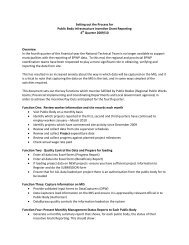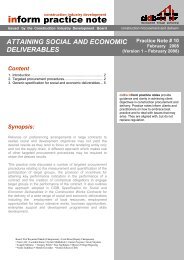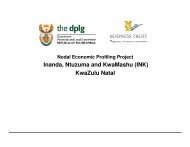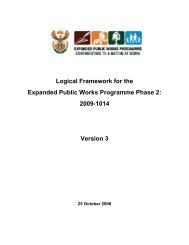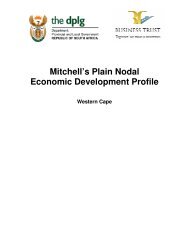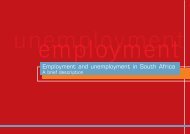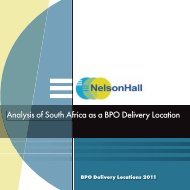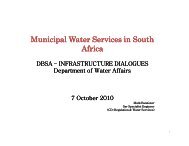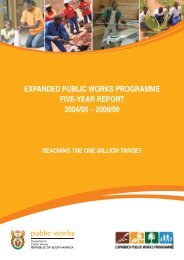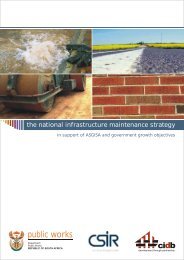Evaluation of the Monyetla Work Readiness ... - Business Trust
Evaluation of the Monyetla Work Readiness ... - Business Trust
Evaluation of the Monyetla Work Readiness ... - Business Trust
Create successful ePaper yourself
Turn your PDF publications into a flip-book with our unique Google optimized e-Paper software.
2.11.1 Factors that could Impact on Training Costs <strong>of</strong> <strong>Monyetla</strong>Programme for <strong>the</strong> Period 2006-2010In developing <strong>the</strong> funding model it was acknowledged that <strong>the</strong> costs were subject to change andcould be influenced by <strong>the</strong> following variables:• Recruitment and selection costs• Learner allowances or salaries• NQF Level <strong>of</strong> <strong>the</strong> learning intervention• Skills requirements – ITC/Management Development training is more costly• Method <strong>of</strong> delivery– such as learnership, skills programme or short course• Learning model – such as e-learning/distance learning, facilitated/personal contact learning,part-time or full-time• Delivery agent – public providers vs. private providers• Any o<strong>the</strong>r conditions/requirements <strong>of</strong> SETAs• Number <strong>of</strong> learners per intervention (Economies <strong>of</strong> scale)• Customisation <strong>of</strong> programmes• Duration <strong>of</strong> programmes• Assessment methods – such as examinations, role-play, assignments and simulation• Availability <strong>of</strong> training material and/or trainer in to meet training need• International component– such as international study modules and overseas visits• Crucial learner/learning support/bridging programmes, will increase costs• Learner administration/management systems2.11.2 Sources <strong>of</strong> FundingA wide range <strong>of</strong> sources were identified as possible funders <strong>of</strong> <strong>the</strong> <strong>Monyetla</strong> programme for <strong>the</strong>period 2006-2010. These were found both locally and internationally and include:• <strong>the</strong> dti• Dept <strong>of</strong> Labour – National Skills Fund (NSF)• Sector Education and Training Authorities – SETAs• Umsobomvu Youth Fund• FET colleges – student financial aid• National Empowerment Fund (NEF)• UK Department for International Development (DFID)• US Agency for International Aid (USAID)• World Bank• European Union (EU)• United Nations Development Programme (UNDP)• Danish Development Co-operation (Danida)• Swedish International Development Co-operation Agency (SIDA)• German Technical Co-operation (GTZ)2.11.3 Funding ApproachDuring <strong>the</strong> process <strong>of</strong> <strong>the</strong> identification <strong>of</strong> sources <strong>of</strong> funding, consultations were also held with <strong>the</strong>Department <strong>of</strong> Labour and <strong>the</strong>se consultations indicated that <strong>the</strong> NSF Window 1 would be <strong>the</strong> onlyreadily accessible source <strong>of</strong> funding for a work readiness programme, and that it can only beaccessed by applications to <strong>the</strong> provinces.20



